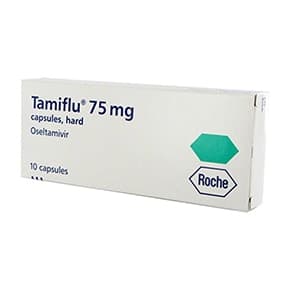- Private & confidential service
- Genuine medication
- All-inclusive service - No hidden fees
- Next day delivery
- Influenza
Influenza: start your consultation
- 1. Answer the online medical questions
- This helps our doctors to decide which treatment is safe for you.
- 2. Select your treatment
- You will see a list of recommended treatments. You can select the one you prefer.
- 3. Checkout and delivery
- Once you’ve completed the checkout, our doctors will review your answers. If all is safe, you will receive your treatment tomorrow.

- Reduces symptoms of flu
- Quickens recovery time
- Easy consultation process
Influenza
Influenza is a highly contagious virus, more commonly referred to as 'flu'. Symptoms often present suddenly and can include high fever and aching muscles. For the very young, the elderly and those with underlying health conditions such as asthma, flu has the potential to be very dangerous.
If you have contracted flu, effective prescription medication can be used. At HealthExpress, we provide flu treatment which can be ordered online without the hassle of leaving the house. A consultation is free and reviewed by one of our in-house, UK-based doctors.
Topics
What is influenza?
Commonly known as flu, influenza is an illness caused by RNA viruses that infect the respiratory tract. When spread by droplets or direct contact, the virus replicates in the respiratory tract and damages your host cells.
Most people can fight this condition effectively over time. However, people who have a lower immune response, such as people who are pregnant, very young, cancer patients, asthmatic, the elderly or those who suffer from pulmonary diseases, are not only more susceptible to catching the virus, but are more likely to suffer more serious symptoms. These can be successfully prevented with the use of effective prescription medication when treating influenza.
Types of influenza virus
There are 3 different types of influenza viruses: A, B, and C. Combined, they are responsible for producing 306 human influenza viruses overall. Typically, type C is less severe. Wild birds are a common carrier of Type A flu, whereas type B is only found in humans.
What causes influenza?
Types A and B are responsible for the epidemics of respiratory illness that occur almost every winter, leading to outbreaks of illness and serious symptoms.
A type C infection is similar to a cold; it usually causes either mild respiratory illness or no symptoms at all. It doesn't have the same public-health impact of influenza types A and B. Most vaccination and preventative efforts are focused on the control of influenza types A and B. All three virus types are spread in the same way: they leave an infected person's body in droplets whenever that person coughs, sneezes, or puts their mouth on another object.

The flu can be transmitted in two ways: An infected person can directly pass the virus to an uninfected person, or an uninfected person can touch a surface that has been contaminated by an infected person and then pass the virus to his or her own body.
What are the symptoms of influenza?
Unlike the common cold, influenza is caused by a group of viruses and symptoms normally start much more suddenly and tend to be more severe in nature and last longer. Symptoms of influenza can include:

Other symptoms include tiredness/weakness, headaches, loss of appetite, indigestion, aches and pains, dry and chesty cough and diarrhoea.

What are the additional benefits of treating influenza?
A number of benefits can be experienced when you successfully treat influenza. These can include the following:
- You can make up for lost sleep, which will improve you alertness and energy levels
- The virus is less likely to spread to others
- More serious conditions that can develop from influenza, such as pneumonia, can be avoided
- Symptoms, such as a chesty cough, diarrhoea and headaches will no longer persist
 Reduced symptoms
Reduced symptomstreating this infection can reduce the prevalence of a chesty cough, fever and headaches
 Reduced contagiousness
Reduced contagiousnessthe virus is less likely to spread to other if treated early enough
 Avoid development of more serious conditions
Avoid development of more serious conditionsby treating influenza well at its earlier stage, the patient can avoid more serious ifnections such as pneumonia
How can I treat influenza?
Natural recovery
The basic way to treat flu symptoms is the old fashioned way: stay at home and drink plenty of fluids. To help with fever, aches and pains, you should take paracetamol, aspirin, ibuprofen or other anti-inflammatory drugs. If you are still hot; sponge yourself down with tepid water and await natural recovery. Recovery usually takes a week, with some symptoms sometimes lingering for a further week afterwards.
Over-the-counter medication
Over-the-counter medications are used to alleviate the symptoms of flu, rather than prevent its further spread. Medications such as antihistamines, decongestants and cough medicines can all help to relieve symptoms, such as a runny nose, watery eyes, a sore throat and coughing.
Antiviral prescription treatment
Prescription treatments are the only way to both prevent and treat the symptoms of flu. They can stop you from developing serious symptoms if you have come into contact with someone who has the virus, and can also relieve existing symptoms.
Tamiflu
Tamiflu is an easy to take and convenient oral medication for treating and preventing influenza (flu). Tamiflu can prevent the onset of flu, even if the patient has been exposed to someone who suffers from it. Tamiflu reduces the severity of symptoms and infections, such as bronchitis, and also helps to reduce the duration of the flu by a day and a half, or even less.
Relenza
Relenza is a prescription only medicine for the treatment of influenza A and B in children and adults aged five years and older. Relenza is inhaled through a device similar to an asthma inhaler every 12 hours for five days. Relenza helps prevent the virus from spreading in your body and may reduce the amount of time you are sick.
How can I prevent influenza?
There are a variety of measures you can follow in order to prevent influenza (flu). These measures include:
- Flu vaccination - this is specifically recommended for those who are at high risk of developing serious complications as a result of an influenza infection.
- Wash your hands regularly with soap and warm water.
- Clean surfaces and handles.
- Use tissues and cover your nose and mouth when sneezing and coughing.
- Using an alcohol-based hand sanitizer regularly can also help.
- Eating a healthy and balanced diet and exercising regularly can also help when preventing influenza.
What options do HealthExpress offer for treating influenza?
Here at HealthExpress we ensure that your health is at the forefront of our concern. Although there is no immediate cure for the flu, you can ensure that you are well protected to reduce the chance of catching the virus, there is also available antiviral treatment in the form of Tamiflu. This treatment not only treats influenza symptoms, but also blocks the spread of the virus, which confines the virus to a smaller area, allowing the immune system to kill the virus. This available treatment is approved by UK qualified doctors and is clinically proven to effectively treat influenza. It can be easily and quickly obtained by completing our free, simple online consultation, which will then be reviewed by our doctors.
medical form
medication
prescription
from pharmacy




